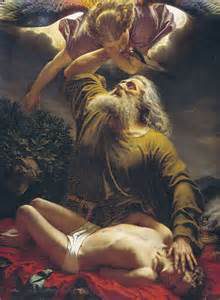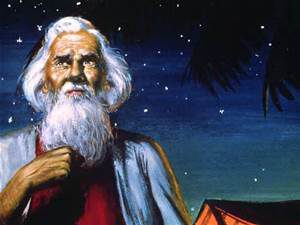Chayei Sarah means “life of Sarah” but ironically it begins with her death! The full meaning actually is “the Life of Sarah WAS.” In the wake of her death, Abraham must find an appropriate place to bury his wife. Ephron the Hittite first offers some land to Abraham for free, but Abraham insists on paying (actually OVERPAYING according to the rabbis) and signing a contract for the land to avoid future strife.
Chapter 24 then gives us the beautiful love story between Isaac and Rebecca. It becomes clear that while Isaac himself gets relatively little attention in Torah compared to his ancestors and descendants, he certainly did very well in the marriage department—Rebecca is in a way his inheritance and treasure. The portion ends with Abraham’s death and a reunion at his funeral with Isaac and Ishmael.
Vayera means “and appeared,” referencing Abba YHWH appearing to Abraham with two other messengers. The trio brings news that Abraham and Sarah will have a son. Sarah, not believing Abba YHWH, laughs at hearing the pronouncement and then denies she did laugh. This is one reason why their son will be called Yitzkhak, “laughter.” Notable here also is that Abraham serves Abba YHWH and His two messengers milk and meat! After this the dark message—the destruction of Sodom and Gomorrah—is given. Since Abraham’s nephew Lot has settled there with his family, they must be evacuated from the coming disaster. At this time also is a remarkable “bargaining” session between Abraham and Abba YHWH, as they debate how many righteous souls must be found to spare the whole city. An incident similar to the one where Pharaoh took Sarah happens again with another ruler, with similar results. The portion ends with the most shocking story of them all, as Abraham is told to kill his son by Abba YHWH Himself!
Vayera means “and appeared,” referencing Abba YHWH appearing to Abraham with two other messengers. The trio brings news that Abraham and Sarah will have a son. Sarah, not believing Abba YHWH, laughs at hearing the pronouncement and then denies she did laugh. This is one reason why their son will be called Yitzkhak, “laughter.” Notable here also is that Abraham serves Abba YHWH and His two messengers milk and meat! After this the dark message—the destruction of Sodom and Gomorrah—is given. Since Abraham’s nephew Lot has settled there with his family, they must be evacuated from the coming disaster. At this time also is a remarkable “bargaining” session between Abraham and Abba YHWH, as they debate how many righteous souls must be found to spare the whole city. An incident similar to the one where Pharaoh took Sarah happens again with another ruler, with similar results. The portion ends with the most shocking story of them all, as Abraham is told to kill his son by Abba YHWH Himself!
Lech Lecha means “get yourself out.” It concerns the command Abba YHWH gives Abram to into Canaan and has a lot of great “action” surrounding that main theme. First, move Abram has a bit of an adventure in Egypt when his wife acquired by Pharaoh because Abram said she was his sister! Then Abram had to do some intricate planning to get ahead of a potential family dispute between himself and his nephew Lot. After that a whole bunch of kings go to war around Abram and closer to home Abram is given the second most difficult test of his life and I’m just scratching the surface here…there’s a ton of action I left out here.
Lech Lecha means “get yourself out.” It concerns the command Abba YHWH gives Abram to into Canaan and has a lot of great “action” surrounding that main theme. First, move Abram has a bit of an adventure in Egypt when his wife acquired by Pharaoh because Abram said she was his sister! Then Abram had to do some intricate planning to get ahead of a potential family dispute between himself and his nephew Lot. After that a whole bunch of kings go to war around Abram and closer to home Abram is given the second most difficult test of his life and I’m just scratching the surface here…there’s a ton of action I left out here.
Note on our recently updated New Testament Podcasts section.
These podcasts of Jaye and I were done originally on a website called www.fromonefaithwecome.com which is no longer active. They were also done originally from 2011-2012, but we are happy to honor the many requests we have received over the years to showcase these teachings here. Enjoy!



